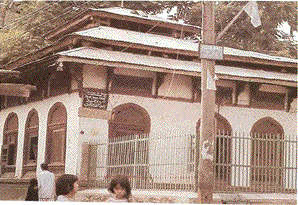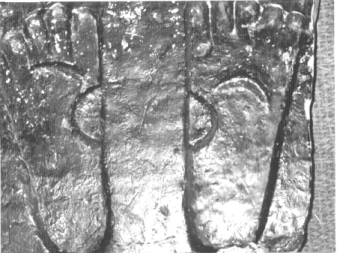Some
Evidence Suggests
Jesus survived the crucifixion at 33,
died at 80+, and was entombed in India.

Is
the body of Jesus entombed in
this building in Srinegar, Kashmir?
BBC
- INTERVIEW
DIRECTOR RICHARD DENTON
Friday, July 11, 2003
BBC Four: Your central question is, did Jesus die on the
cross, rather than did Jesus die at all.
Richard Denton: It is, really. I originally wanted to call
it, 'The Body of Christ,' because that seems to me to be the crucial
question. Obviously, he died at some point, but when and how is
the question.
BBC Four: How do you think he might have survived crucifixion?
RD: Crucifixion took up to three days; the maximum he was
on the cross for was nine hours, it might even have been six. And
even if you read the gospels, Pontius Pilate is clearly surprised
that he's already dead, and wants to be reassured by the centurion
that he really is dead. My personal take on it would be that he
goes into a shock induced coma, and probably they thought he was
dead.
BBC Four: If he did survive, why do you think it's not
related in that way in the gospels?
RD: First of all, they would think it was a miraculous
resurrection. You don't have to think of that as a conspiracy theory,
or a lie, it's just a mistake. What you then have to do is get him
out of the way. The real question doesn't hang over the resurrection,
which I think is explicable. The real question hangs over him ascending
into heaven.
BBC Four: You make the point that the Ascension isn't actually
mentioned in the gospels.
RD: It's not in any of the original versions of the gospels,
which is astonishing. It was in the last 16 verses of Mark, which
were put in 300 years after, and it's inserted in a sentence, into
some versions of Luke, because he was assumed to have written the
Acts, and it's mentioned in the Acts of the Apostles. That, I think
is the lie, the cover story, to get him out of the country.
BBC Four: If Jesus was revived in this way, where then
did he go?
RD: One story is that he gets out and goes to the South
of France with Mary Magdalene, there is a certain amount of evidence
that she went there. And the other is that he goes to India, and
there are a number of versions of this. One of which, suggests that
in fact, he had already been to India during the missing years,
between 12 and 29.
BBC Four: It was very interesting, the parallel between
the story of the three kings, and the search for a reincarnated
Lama …
RD: Absolutely, we explore that and the similarities between
the miracles and the teachings of the Buddha and Jesus in the program.
And of course Buddha pre-dates Jesus by about 500 years, so it's
not unreasonable that he may have gone to India, learned Buddhist
teaching, and brought it back. Then, when he returns to India, after
the crucifixion, he carries on the ministry in Kashmir until he
dies at the age of 80.
BBC Four: What actually prompted you to start exploring
this topic?
RD: I was intrigued because most academic theologians and
intelligent churchmen, or a very significant number of them, do
not believe that the resurrection is the literal truth. It's a metaphor
to tell us that there is hope. Whilst not saying that it's a literal
truth, they don't actually say it's a lie, but if you're saying
something's not literal truth, then you are saying it's a lie. I
was shocked that none of the people we interviewed, with the exception
of the Cannon of Westminster, believed it was true. Yet if they
don't think it's true, what on earth do they think is the motivation
behind writing the story in the Bible?
BBC Four: You say that the resurrection and the literal
truth of the Gospel, have in the past, been the cornerstone of Christianity.
RD: Exactly. And the idea that you can go on preaching
this to the ordinary faithful, while not believing it yourself,
seemed to me truly offensive. So what I was looking for was another
version of the story that had the possibility of being historically
true, that could have been misinterpreted by the people at the time,
so that what they said was not a lie, it was the way they understood
it.
BBC Four: And in the end, have you found that to be the
most credible account?
RD: Yes, I think so. On the other hand, I am a person who
does not find the idea of rising from the dead and ascending into
heaven credible. I'm faced with the choice, do I believe that the
gospel writers were cunning liars, or do I think that they were
simple men who misunderstood things, and were amazed by this man.
BBC Four: And did these feet, in ancient times, walk upon
England's mountains green?
RD: I personally don't think they did walk upon England's
mountains green. I think they walked upon Kashmir's mountains green.
They may have walked in France, for all I know. See
Documentary.
Did
Jesus Survive The Crucifixion?

BBC - DOCUMENTARY
Monday, February 5, 2007
12:45 AM-1:45 AM (Sunday)
This film investigates the variety of stories surrounding the New
Testament account of the crucifixion, death, resurrection and ascension
of Jesus, by interviewing historians, theologians and historical
researchers. This exploration of the latest theories about what
really happened to Jesus 2000 years ago uncovers some surprising
possibilities.
At the heart of the mystery is the suspicion that Jesus might not
actually have died on the cross. The film concludes that it was
perfectly possible to survive crucifixion in the 1st Century - there
are records of people who did. But if Jesus survived, what happened
to him afterwards?
One of the most remarkable stories concerns the charismatic preacher
Jus Asaf (Leader of the Healed) who arrived in Kashmir in around
30 AD. Before he died at the age of 80, Jus Asaf claimed that he
was, in fact, Jesus, the Christ, and the program shows his alleged
tomb, next to which are his carved footprints which bear the scars
of crucifixion.


Why were these foot carvings made and placed next to this tomb in Kashmir?
"The
position of the scars, just behind the toes, do not match each other,
but they would align if a single nail was driven through both of
the feet with the left foot placed on top of the right." --
See
Documentary.
The
Crucifixion
BY AN
EYEWITNESS
The
Dead Sea Scrolls were uncovered in 1947.
What do the Dead Sea Scrolls reveal about Jesus, and why haven't
these works been published, in full, after 65 years of 'research'?
Is it possible that the Gnostic
Gospels of Egypt, along with the
Dead Sea Scrolls, reveal data that corroborates Jesus'
survival,
as claimed in 'The Crucifixion,' by An Eyewitness? Is this
account the non-fictional sequel to 'The Da Vinci Code'?
Is this the Greatest Story Never Told?
See
what really happened to Jesus.

Pages And Points To Ponder
Crucifixion
By An Eyewitness
































